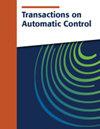具有指数稳定性保证的饱和上升控制器:一种投影动态系统方法
IF 7
1区 计算机科学
Q1 AUTOMATION & CONTROL SYSTEMS
引用次数: 0
摘要
误差符号的鲁棒积分(RISE)控制方法产生了一个强大的连续控制器,尽管存在时变和状态相关的干扰,但仍能产生指数跟踪误差收敛。然而,在致动器饱和的情况下,设计RISE控制器使其产生指数跟踪误差收敛一直是一个悬而未决的问题。虽然已有的结果为RISE控制器提供了饱和方案,但这些结果只能保证使用基于lyapunov的分析的渐近跟踪误差收敛。本文提出了一种利用投影算法和辅助滤波器实现指数跟踪误差收敛的新设计策略。这种新策略不使用三角或双曲饱和函数固有的以前的饱和(或限幅)控制器。因此,基于李雅普诺夫的分析可以构造出跟踪误差的指数收敛。对比仿真结果表明,所提出的方法与基准控制器相比具有良好的性能。该方法可以在比基线方法更低的饱和极限下工作,同时保持稳定性并实现指数跟踪误差收敛。本文章由计算机程序翻译,如有差异,请以英文原文为准。
Saturated RISE Controllers With Exponential Stability Guarantees: A Projected Dynamical Systems Approach
The robust integral of the sign of the error (RISE) control approach results in a powerful continuous controller that yields exponential tracking error convergence despite the presence of time-varying and state-dependent disturbances. However, designing the RISE controller to yield exponential tracking error convergence in the presence of actuator saturation has been an open problem. Although there are existing results that provide a saturation scheme for RISE controllers, these results only guarantee asymptotic tracking error convergence using a Lyapunov-based analysis. In this article, a new design strategy is developed using a projection algorithm and auxiliary filters to yield exponential tracking error convergence. This new strategy does not employ trigonometric or hyperbolic saturation functions inherent to previous saturated (or amplitude limited) controllers. As a result, a Lyapunov-based analysis can be constructed that yields exponential convergence of the tracking errors. Comparative simulation results demonstrate the performance of the developed method in comparison with a baseline controller. The developed method can operate at a lower saturation limit than the baseline method while maintaining stability and achieving exponential tracking error convergence.
求助全文
通过发布文献求助,成功后即可免费获取论文全文。
去求助
来源期刊

IEEE Transactions on Automatic Control
工程技术-工程:电子与电气
CiteScore
11.30
自引率
5.90%
发文量
824
审稿时长
9 months
期刊介绍:
In the IEEE Transactions on Automatic Control, the IEEE Control Systems Society publishes high-quality papers on the theory, design, and applications of control engineering. Two types of contributions are regularly considered:
1) Papers: Presentation of significant research, development, or application of control concepts.
2) Technical Notes and Correspondence: Brief technical notes, comments on published areas or established control topics, corrections to papers and notes published in the Transactions.
In addition, special papers (tutorials, surveys, and perspectives on the theory and applications of control systems topics) are solicited.
 求助内容:
求助内容: 应助结果提醒方式:
应助结果提醒方式:


